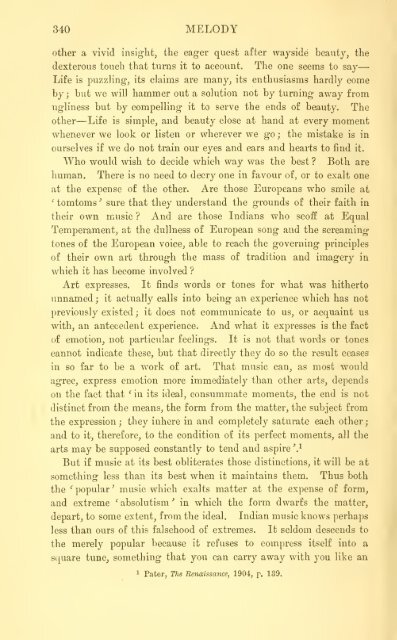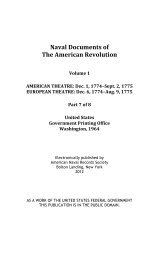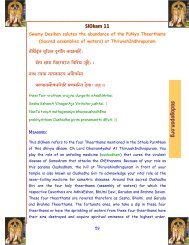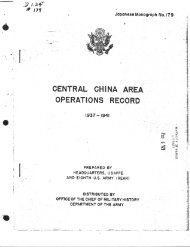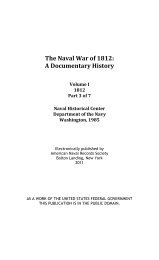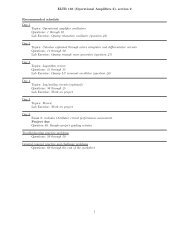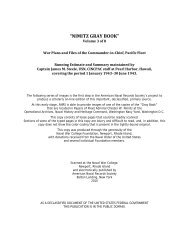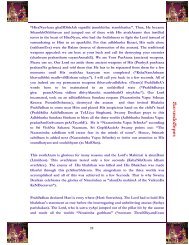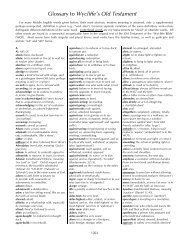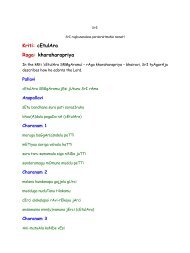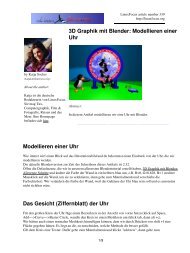- Page 1 and 2:
K -rryr'rnM-t
- Page 5 and 6:
THE MUSIC OF HINDOSTAN
- Page 8 and 9:
'^m \t \
- Page 10 and 11:
2599;. 1 ^')o>J: u^AoAUli:^, 7 /
- Page 12 and 13:
vi PREFACE appear also in the Index
- Page 14 and 15:
TABLE OF CONTENTS INTRODUCTION The
- Page 16 and 17:
X TABLE OF CONTENTS CHAPTER X THE S
- Page 18 and 19:
; 2 INTRODUCTION were under sentenc
- Page 20 and 21:
4 INTRODUCTION it, had been in the
- Page 22 and 23:
6 INTRODUCTION converse is never tr
- Page 24 and 25:
; 8 INTRODUCTION preserve names and
- Page 26 and 27:
10 INTRODUCTION a skin may be stret
- Page 28 and 29:
13 INTRODUCTION form a dim cluster
- Page 30 and 31:
; 14 INTRODUCTION our short and for
- Page 33 and 34:
' INTRODUCTION 15 days, must be sou
- Page 35 and 36:
CHAPTER I A MUSICAL DIARY The follo
- Page 37 and 38:
A MUSICAL DIARY 19 whom we actually
- Page 39 and 40:
A MUSICAL DIARY 21 and wheiij after
- Page 41 and 42:
: : : : A MUSICAL DIARY 23 d = 60.
- Page 43 and 44:
: A MUSICAL DIARY 25 ^^=^S-^^ Choru
- Page 45 and 46:
; A MUSICAL DIARY 27 Most of the ph
- Page 47 and 48:
A MUSICAL DIARY 29 dancing, with Ra
- Page 49:
PLATE 2 o p. 30
- Page 52 and 53:
1 : 33 A MUSICAL DIARY of course to
- Page 54 and 55:
Dr:-. KA.^U3^- j. : • f : : 34 A
- Page 56 and 57:
: 36 A MUSICAL DIARY They are quite
- Page 58 and 59:
: LJ—-U-^ 38 A MUSICAL DIARY Ex,
- Page 60 and 61:
J 40 A MUSICAL DIARY Solo. Ex. 72.
- Page 62 and 63:
42 A MUSICAL DIARY 1st version, ins
- Page 64 and 65:
44 A MUSICAL DIARY Padi. Puranlva.
- Page 66 and 67:
46 A MUSICAL DIARY India shaJmai),
- Page 69 and 70:
^ r A MUSICAL DIARY 47 Tonic E|7. -
- Page 71 and 72:
: A MUSICAL DIARY 49 11. A mixture
- Page 73 and 74:
! — A MUSICAL DIARY 51 'Still, I'
- Page 75 and 76:
Ex.(»^: ,n ,n-- IJJ \JJ A MUSICAL
- Page 77 and 78:
; ! A MUSICAL DIARY 55 ^might ^^ ^'
- Page 79 and 80:
-r ' A MUSICAL DIARY 57 To such tun
- Page 81 and 82:
A MUSICAL DIARY 59r B.C. CODA.
- Page 83 and 84:
14)9,m^^jj-ji^-'jj Ex. i A MUSICAL
- Page 86 and 87:
PLATE 4 ^ Rri2ri-srrinclin,ac. vliP
- Page 88 and 89:
; 64 A MUSICAL DIARY Rararo. J =90.
- Page 90 and 91:
66 A MUSICAL DIARY Adagio. J = 80.
- Page 92 and 93:
68 A MUSICAL DIARY ^scent of the pa
- Page 94 and 95:
T — 70 A MUSICAL DIARY The Gurkha
- Page 96:
: 72 A MUSICAL DIARY Imitation at d
- Page 99 and 100:
— CHAPTER III LEGEND, HISTORY, AN
- Page 101 and 102:
LEGEND, HISTORY, AND THE PRESENT DA
- Page 104 and 105:
PLATE 6 n t-i •^ p: =4-1 o
- Page 106 and 107:
: 78 LEGEND, HISTORY, AND THE PRESE
- Page 109 and 110:
: LEGEND, HISTORY, AND THE PRESENT
- Page 111:
PLATE 8 Dancing girl, South India.
- Page 114:
82 LEGEND, HISTORY, AND THE PRESENT
- Page 117 and 118:
LEGEND, HISTORY, AND THE PRESENT DA
- Page 119 and 120:
; LEGEND, HISTORY, AND THE PRESENT
- Page 121:
PLATE 10 Seshanna, vlnu-player, Mys
- Page 124 and 125:
83 LEGEND, HISTORY, AND THE PRESENT
- Page 126 and 127:
90 LEGEND, HISTORY, AND THE PRESENT
- Page 128 and 129:
92 LEGEND, HISTORY, AND THE PRESENT
- Page 130 and 131:
94 LEGEND, HISTORY, AND THE PRESENT
- Page 132 and 133:
l j . 96 LEGEND, HISTORY, AND THE P
- Page 134 and 135:
' 98 LEGEND, HISTORY, AND THE PRESE
- Page 136 and 137:
; ; CHAPTER IV THE SCALE You can wo
- Page 138 and 139:
102 THE SCALE Mute scales. Approxim
- Page 140 and 141:
104 THE SCALE Also, in no case (unt
- Page 142 and 143:
— 106 THE SCALE The Rdgamhodha of
- Page 144 and 145:
—; 108 THE SCALE rarely used the
- Page 146 and 147:
no THE SCALE 2-24 respectively.^ Th
- Page 148 and 149:
112 THE SCALE s The A of the Sa-grd
- Page 150 and 151:
;, 114 THE SCALE We will now digres
- Page 152 and 153:
: > 116 THE SCALE in ratios^ their
- Page 154:
: ''^ 118 THE SCALE It may be notic
- Page 157 and 158:
THE SCALE 121 therefore, for two of
- Page 159 and 160:
: THE SCALE 123 (Incidentally, the
- Page 161 and 162:
THE SCALE 125 but only by calculati
- Page 163 and 164:
THE SCALE 127 But the D and A scale
- Page 165 and 166:
: : THE SCALE 129 In these instance
- Page 167 and 168:
! : THE SCALE 131 Ex. 204. ,1',',.
- Page 169 and 170:
— THE SCALE 133 X 3 = 42 cents).
- Page 171 and 172:
MODE 135 Ffl's the exception, we sh
- Page 173 and 174:
: : as merely weird and fanciful. M
- Page 175 and 176:
: MODE 139 Bilaskhanl Todi. 218.^ -
- Page 177 and 178:
—; ' MODE 141 mention of it, and
- Page 179 and 180:
: : —; MODE 143 which would still
- Page 181 and 182:
MODE 143 because, if we emphasize t
- Page 183 and 184:
MODE 147 stantive to passing chord
- Page 185 and 186:
MODE 149 now, conscious of absolute
- Page 188 and 189:
HINDOSTANl RAGS GujarSl- GujCkraJ-
- Page 190 and 191:
; 152 RAGA the mordents show where
- Page 192 and 193:
154 RAGA So that there is a real mu
- Page 195 and 196:
RAGA 155 his mythology round them.
- Page 197 and 198:
RAGA 157 defined limits of the Rag
- Page 199 and 200:
: : RAGA 159 while the descent from
- Page 201 and 202:
: D.C.al . —; RAGA 161 Tu-mi ja -
- Page 203 and 204:
— ; RAGA 163 of rjf G Ab—a note
- Page 205 and 206:
. ' RAGA 165 the first is a Svardva
- Page 207 and 208:
RAGA 167 P Ki am - ri - ta tu - mi
- Page 209 and 210:
— ; ; EAGA 169 and goodwill some
- Page 211 and 212:
; RAGA 171 seiousness. Any one can
- Page 213 and 214:
: : : RAGA 173 But they avoid putti
- Page 215 and 216:
; RAGA 175 note of the scale may be
- Page 217 and 218:
^^rti:i^'lS^0^i=^=^^^^ RAGA 177 ba
- Page 219 and 220:
: pure and simple is at a similar d
- Page 221 and 222:
: Bot. of it : CHAPTEE VII GRACE Th
- Page 223 and 224:
from its position ; GRACE 183 indee
- Page 225 and 226:
GRACE 185 and is probably intended
- Page 227 and 228:
: GRACE 187 and then singing or whi
- Page 229 and 230:
GRACE 189 ^ F?^ '—-'— i^^^^^^ =
- Page 231 and 232:
: : CHAPTER VIII TALA Language, Ver
- Page 233 and 234:
atodvam : the metre intentionally i
- Page 235 and 236:
is mandala atque TALA 195 dra lia,
- Page 237 and 238:
: TALA 197 There are many dozens of
- Page 239 and 240:
J TALA 199 1&2. ton . . Ji - vhe -
- Page 241 and 242:
: TALA 201 The Ttatndkara gives 120
- Page 243 and 244:
— TALA 203 If the explanation of
- Page 245 and 246:
TALA 205 the look of which frighten
- Page 247 and 248:
: TALA 2or 2nd half. ra - ra va - d
- Page 249 and 250:
singer and drummer from time to tim
- Page 251 and 252:
TALA 211 Rank B. 10 20 30 40 50 60
- Page 253 and 254:
) JRupaka is in idea Saraband rhyth
- Page 255 and 256:
TALA 215 t7lrf^J]j:\}ST7} J -IJTTT
- Page 257 and 258:
J J : J TALA 217 3 + 2+2 3 + 2 + 2]
- Page 259 and 260:
: TALA 219 two equal sections are m
- Page 261 and 262:
: TALA 221 Adagio. the phrases are
- Page 263 and 264:
: : TALA 223 genuine instance we ha
- Page 266 and 267:
PLATE 11 ' Tin The '. second finger
- Page 268:
226 DRUMMING little In Hindu music
- Page 271 and 272:
DRUMMING 227 mrddnga the driving in
- Page 273:
PLATE 13 pq p. be ^ -2 :3 ^ fQ P. 2
- Page 276 and 277:
230 DRUMMING Nor is much help to be
- Page 278 and 279:
J : ^ 232 DRUMMING which is very co
- Page 280 and 281:
234 DRUMMING jz jz n r: n r^j^ j^sz
- Page 282 and 283:
U I J""?S 236 DRUMMING next one^ ho
- Page 284 and 285:
: ; 238 DRUMMING The two oboes, alw
- Page 286 and 287:
240 DRUMMING Ex.
- Page 288 and 289:
6 : : 242 DRUMMING Similarly one Td
- Page 290 and 291:
' : I I I I I 1 II 1 I ?44 DRUMMING
- Page 292 and 293:
;' CHAPTER X THE SAMAN CHANT It is
- Page 294 and 295:
: ; 248 I^HE SAMAN CHANT appog-giat
- Page 296 and 297:
250 THE SAMAN CHANT ceremonial was
- Page 298 and 299:
— 252 THE SAMAN CHANT (mMd). The
- Page 300 and 301:
— ^ — 254 THE SAMAN CHANT — (
- Page 302 and 303:
: 256 THE SAMAN CHANT The system of
- Page 304 and 305:
258 ^ CQ M •* lo to i> 00 o> o CO
- Page 306 and 307:
— 260 THE SAMAN CHANT melody ; wh
- Page 308 and 309:
^ 262 THE SAMAN CHANT those of the
- Page 310 and 311:
: : ^64 THE SAMAN CHANT invention),
- Page 313 and 314:
lines 24 and 25 combine these, THE
- Page 316 and 317:
268 THE SAMAN CHANT
- Page 318 and 319:
: : 1 270 THE SAMAN CHANT aceei. a
- Page 320 and 321:
: : murdhanam divo aratim prthivya
- Page 322 and 323:
274 THE SAMAN CHANT half a dozen st
- Page 324 and 325:
— 276 THE SAMAN CHANT atihdra (ex
- Page 326 and 327:
I ' i 'I : —: : 278 THE SAMAN CHA
- Page 328 and 329:
— ; CHAPTEH XI FORM That principl
- Page 330 and 331:
MP 282 FORM This is the form in Sou
- Page 332 and 333:
284 FORM /^b ^ !— 5 —\—H^
- Page 334 and 335:
; 286 FORM to rest principally on t
- Page 336 and 337:
288 FORM Ka-ba ho . . ka-pi A . . A
- Page 338 and 339: 290 FORM -^ -^ -*-• ka - pi
- Page 340 and 341: ^ 1^1 : 292 FORM j y , u I _ ^ , ;
- Page 342 and 343: 294 FORM
- Page 344 and 345: 296 FORM gho a • wen-ge Ka-bahoka
- Page 346 and 347: ' ^ ' \ ' i ' 298 FORM 3 3 _ » ^^S
- Page 348 and 349: : 300 FORM pantomime or dancing. Th
- Page 350 and 351: 302 FORM Ex. 384. Hamirkalian. Rupa
- Page 352 and 353: 391. :^K"t' Ast. Kedara. Dhamar. |
- Page 354 and 355: 306 FORM Kafi. Dh.imar. Dorian. Thr
- Page 356 and 357: 308 FORM Ant. $ P==^ i^^ ^.^^^-r.-U
- Page 358 and 359: -g^f> 310 FORM ^>Ar- r-rf^f=^^=crrT
- Page 360 and 361: 313 FORM Ex. Bhairavi. i> ,bb Rupak
- Page 362 and 363: 314 FORM Multanl. Jhamra. Shrlrag.
- Page 364 and 365: J 316 FORM Lalat. Rupak. Mamva. Rup
- Page 366 and 367: 318 FORM Kalian.
- Page 368 and 369: -> : CHAPTER XII MELODY He will put
- Page 370 and 371: : 322 MELODY for every time and pla
- Page 372 and 373: 324 MELODY between is transilient,
- Page 374 and 375: : ;' 326 MELODY To continue Schuber
- Page 376 and 377: 328 MELODY "We feel also that Beeth
- Page 378 and 379: —; 330 MELODY their goods in the
- Page 380 and 381: 333 MELODY because of the frequency
- Page 382 and 383: : : 334 MELODY part of the scale, t
- Page 384 and 385: — 336 MELODY In the Andante of Br
- Page 386 and 387: : : — 338 MELODY and the scansion
- Page 390 and 391: : 342 MELODY When all composition i
- Page 392 and 393: — 344 APPENDIX I Again, is there
- Page 394 and 395: BIBLIOGRAPHY OF WORKS IN EUROPEAN L
- Page 396 and 397: 348 BIBLIOGRAPHY (Panjabi), the boo
- Page 398 and 399: : 350 BIBLIOGRAPHY 34. Hermann Jaco
- Page 400 and 401: 352 BIBLIOGRAPHY Musicians and Styl
- Page 402 and 403: 354 GLOSSARY AND INDEX augmentation
- Page 404 and 405: 356 GLOSSARY AND IXD1^,X European r
- Page 406 and 407: : 358 GLOSSARY AND INDEX Localities
- Page 408 and 409: ) 360 GLOSSARY AND INDEX Rd(j Bilas
- Page 410 and 411: 362 GLOSSARY AND INDEX .•^tohhu,
- Page 412: 364 GLOSSARY AND INDEX vadT, unison
- Page 416: SB^aiMibkiiuawaMiaaMaa ill


